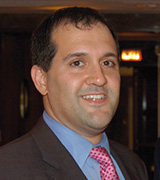Distrust but verify

by Endy Zemenides
The famous American author Mark Twain supposedly said: “History doesn’t repeat itself, but it often rhymes”. As I engaged with senior Obama Administration officials during the annual PSEKA Cyprus Conference, this saying kept coming to mind.
To be fair, most of the senior officials were not in such high positions during other key moments in the Cyprus problem. Yet I still got a strange sense of déjà vu when I heard State Department officials, National Security Officials, and the Vice President’s advisors make some pretty bold pronouncements. Here are some of them (along with my reaction).
“We are closer than we’ve ever been before”: I know it was a different U.S. Administration and a different U.N. Secretary General, but does the international community forget how often we heard those very words in 2003 and 2004? Moreover, this statement is just objectively incorrect. In 2004, Cypriots were presented with a complete – albeit fatally flawed – plan for reunification. Although everyone claims that discussions on security (guarantees and troops) and territory have not begun yet, they incredibly compare the process so far to getting nearly to the finish line in 2004.
“It is our assessment that Turkey wants a solution to the Cyprus problem”: It has ALWAYS been the assessment of the United States that Turkey wants a solution to the Cyprus problem. In fact, Administration after Administration has been explicitly saying this to Congress since the late 1970’s. The arms embargo on Cyprus requires the President to certify to Congress that Turkey is taking steps to end it occupation of Cyprus every six months, and that is exactly what every Administration has been doing since. Nowadays, the Obama Administration tells us that energy is motivating Turkey to solve Cyprus, but in 2009 the same Administration was telling us that Turkey’s “zero problems with neighbors” foreign policy was giving us an opening on Cyprus and in 2004 the Bush Administration was trying to convince us that Erdogan’s EU aspirations made Turkey more likely to deal on Cyprus.
“This is the first time a Turkish-Cypriot leader gets along so well with the President of the Republic of Cyprus and is independent from Ankara”: This is one of the more curious statements we keep hearing, because it wasn’t that long ago (2009 in fact), that the Obama Administration itself was saying the exact same things about then Turkish-Cypriot leader Talat. They were encouraged by his personal relationship with President Christofias. They were excited by his criticism of the Turkish occupation presence. They wanted to bolster him so much that they had the ill-conceived and ultimately aborted notion of inviting him to the White House.
These senior Administration officials must think we are merely jaded by 42 years of occupation and frustrated hopes (rather than being better informed than them), and they constantly encourage the Greek-American community to: (a) create the political space for the Anastasiades government to make a deal; (b) to encourage Greek-Cypriots to support the deal negotiated between President Anastasiades and Akinci; and (c) to play a role in the financing of the solution.
But the Administration’s point man on Cyprus, Vice President Biden, should know better. He has experienced all 42 years of this occupation either as a U.S. Senator or as Vice President of the United States. He was in office when the second wave of the invasion – Atilla II – was launched while Greek-Cypriots were contemplating a proposal for a bi-zonal, bi-communal federation. He was a high ranking member of the Senate Foreign Relations Committee when Turkish occupation forces and their compatriots in the Grey Wolves murdered Tassos Isaac and Solomos Solomou. He was the highest ranking Democrat on the Senate Foreign Relations Committee during the time of the Annan Plan. He was Vice President when Turkey pressured Turkish Cypriots to pull out of negotiations in 2012 (because the Republic of Cyprus assumed the rotating presidency of the European Union) and when Turkey scuttled negotiations right after his historic visit to Cyprus by sending the Barbaros into Cyprus’ EEZ. Joe Biden knows exactly why Turkey is not trustworthy.
Fortunately, the Obama Administration has already laid out a framework for dealing with foreign nations that are less than trustworthy. Just one night before the Cyprus conference began, President Obama’s National Security Advisor – Susan Rice – spoke to the American Jewish Committee. Seeking to reassure the AJC’s conference that the U.S. will not allow Iran to acquire nuclear weapons, she declared that the U.S.’s approach the Iranian nuclear agreement is quite simply, “distrust but verify”.
Distrust but verify should also officially be adopted by the Obama Administration vis-à-vis Turkey in the Cyprus negotiations. No one – not President Anastasiades, not the Greek-American community, not a single Cypriot who will vote in a referendum – should be asked to trust Turkey before tangible contributions are offered AND implemented before a referendum. In a united voice, the Greek “lobby” – HALC, PSEKA, the Cyprus Federation, the Coordinated Effort of Hellenes, AHI and AHEPA – laid out tangible contributions that Turkey can make immediately. We also all declared that without such contributions, we cannot imagine how we can endorse any agreement in 2016. Iran had to implement concrete measures before a deal could be executed; we demand the same for Turkey. Until then, our approach will be to “distrust, but verify”.











0 comments